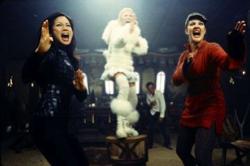![]() So I’m doing it again. Writing on a project that I feel in my gut is doomed. It’s paying me money and I know many writers are looking for that first paying gig. This is my umpteenth paying gig, and somehow I’m not really that much further along in my career than I was four years ago when I started. But I am a bit wiser. Wise enough to know when producers and development execs are really out to lunch. But apparently not wise enough to jump off this sinking ship. Baby needs a new pair of shoes, right?
So I’m doing it again. Writing on a project that I feel in my gut is doomed. It’s paying me money and I know many writers are looking for that first paying gig. This is my umpteenth paying gig, and somehow I’m not really that much further along in my career than I was four years ago when I started. But I am a bit wiser. Wise enough to know when producers and development execs are really out to lunch. But apparently not wise enough to jump off this sinking ship. Baby needs a new pair of shoes, right?
And so I must ask someone wiser and infinitely more successful than I am: at what point do you pull the plug. You know, you’re getting notes that make no sense. You’re executing a project that is someone else’s “idea”…though you know full well this someone doesn’t realize that his idea is nothing yet…not until you deliver a script that will undoubtedly be everything he did not imagine (because he really hasn’t imagined anything at all).
When do you save yourself the embarrassment and heartache and suddenly become “unavailable due to a scheduling conflict.” Yes, sometimes the most unlikely projects fraught with problems go on to become successes. Apparently Casablanca didn’t have a script and was being written anew the night before each shooting day. But my experience also tells me that is the exception and that doing it “right” has a higher likelihood of turning out a creatively successful product. What’s John August’s tipping point? When does he leap? What are the danger signs that make John August say, “My employers are completely whacked and I’m catching the next bus out of here”?
— Skip
Vancouver
Often, the only power a screenwriter has is to walk away, and the decision whether to do it is almost never straightforward. But there are a few key points to consider:
1. **Write movies, not scripts.** Always recognize that the words scrolling up and down on your monitor are the means to an end, not the end itself. An unproduced screenplay is like blueprints for an unbuilt skyscraper — brilliance is irrelevant if it never gets made. So ask yourself: “Am I giving up because of a fundamental concern about the movie, or a concern about the script?” The former is valid, the latter isn’t.
2. **Don’t do free repairs on sinking ships.** The Writers Guild (or the Canadian equivalent) would like to remind you that you’re never supposed to do free rewrites, but the reality is that for a project you believe in, you’re willing to do whatever it takes to get it right. But if you’re questioning the producers’ commitment to the project, ask to get paid for that next batch of tiny tweaks. If they balk, it’s that much easier to walk.
3. **Set some objectives and deadlines.** Agree to do that next pass, but only if they’ll commit to taking it out to directors. Insist on having the follow up meeting this week, not a month from now. Don’t let it drag out.
4. **Write your own notes.** Before the next revision, give them a set of written notes about what you want to do. Let that be the template. If they’re not on board, it’s clearly time to move on.
If it’s any consolation, the decision of when to cut one’s losses never gets easier. I had to walk away from both Charlie’s Angels movies when they completely went off the rails, only to come back later. More recently, I had to let Tarzan go, after more than a year of work.
In both cases, I felt profound frustration and disappointment, both in myself and the people who’d hired me. It wasn’t just the amount of wasted work, but the sense that I was abandoning my creations. The characters were real to me, and now wouldn’t get a chance to live. (This dilemma ultimately became one of the storylines in The Movie.)
The only upside I can offer is that once you leave a project, you remember how many other movies you want to write. Shutting one door opens others.

 I’ve been thinking to write you this letter for a while. I saw the movie [Charlie’s Angels: Full Throttle](http://imdb.com/title/tt0305357/combined) on a movie channel recently. As a Mongolian, I’m deeply offended by your knowledge about my country.
I’ve been thinking to write you this letter for a while. I saw the movie [Charlie’s Angels: Full Throttle](http://imdb.com/title/tt0305357/combined) on a movie channel recently. As a Mongolian, I’m deeply offended by your knowledge about my country.